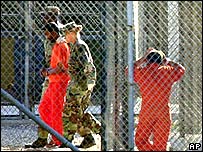Untitled Document
 |
|
Detainees have told of being force-fed through nasal tubes
|
More than 250 medical experts have signed a letter condemning the US
for force-feeding prisoners on hunger strike at Guantanamo Bay, Cuba.
The experts, from seven nations, said physicians at the prison had to respect
inmates' right to refuse treatment.
The letter, in the medical journal The Lancet, said doctors who used restraints
and force-feeding should be punished by their professional bodies.
Some 500 terror suspects are being held without trial at Guantanamo Bay.
The US has argued that the Geneva Convention does not apply to prisoners at
the camp, who, it says, are enemy combatants who continue to pose a threat to
national security.
Human rights groups and the UN have urged the US to close down the facility.
Amnesty International said the "troubling" accusations in the doctors'
letter underlined the need for the "independent medical examination of
the prisoners".
'Different person'
The open letter in the Lancet was signed by more than 250 top doctors from
seven countries - the UK, the US, Ireland, Germany, Australia, Italy and the
Netherlands.
"We urge the US government to ensure that detainees are assessed by independent
physicians and that techniques such as force-feeding and restraint chairs are
abandoned," the letter said.
The doctors said the World Medical Association - a world body representing physicians,
including those in the US - specifically prohibited force-feeding.
They said the American Medical Association, a member of the world group, should
instigate disciplinary proceedings against any members known to have violated
the code.
Detainees at the camp have said hunger-strikers were strapped into chairs and
force-fed through tubes inserted in their noses.
Former inmate Mundah Habib told the BBC he stopped eating because drugs
were put in his food. "As soon as I had the food I found I was a different
person," he said.
He said the hunger strike was the only way to "send a message to the public
outside to know what's going on".
More than 80 inmates are said to have gone on hunger strike in December last
year - a figure that has now reportedly dropped to four.
'Patient's decision'
Dr David Nicholl, a UK neurologist who initiated the Lancet letter, told the
BBC's World Today programme that US doctors going to Guantanamo Bay were being
screened to ensure they agreed with the policy of force-feeding.
"In effect they are screened to make sure they don't have doctors with
a conscience."
Dr Nicholl said it was the patient's decision to go on hunger strike and the
doctor's responsibility was to explain the consequences and confirm the patient
was sane.
In February, Lt Col Martin, chief military spokesman at the US detention facility,
said force-feeding was administered "in a humane and compassionate manner"
and only when necessary to keep the prisoners alive.
But Dr Nicholl said that "horrible as it may sound" the doctor had
to conform to the wishes of hunger strikers, even if it led to their deaths.
Dr Nicholl said the letter's signatories felt there was not enough publicity
about the matter in the US media and that Americans needed to be challenged.
He said the definition of torture issued at the camp in 2002 as actions that
caused only "death or major organ failure" was "not a definition
anyone on the planet is using".
HUNGER STRIKE
July 2005: 52 detainees begin hunger strike, second
of the year, in protest at detention and treatment
14 Sept: Lawyers say more than 200 are refusing food.
The US military says 128
21 Sept: US says number falls to 45. No explanation
given but some tube-feeding admitted
7 Oct: US says number down to 28, 20 of whom are
force-fed
27 Oct: US judge "deeply troubled" by force-feeding
25 Dec: Hunger strikers leap to 84, the US says
9 Feb, 2006: US says number down from 84 to four
but gives no reason

